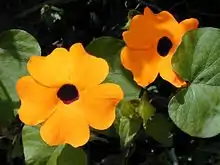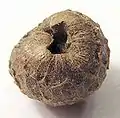Thunbergia alata
Thunbergia alata, commonly called black-eyed Susan vine,[3] is a herbaceous perennial climbing plant species in the family Acanthaceae. It is native to Eastern Africa, and has been naturalized in other parts of the world. It is found in Cerrado vegetation of Brazil and Hawaii, along with eastern Australia and the southern USA in the states of Texas and Florida[4] and in Puerto Rico.[5]
| Black-eyed Susan vine | |
|---|---|
 | |
| Scientific classification | |
| Kingdom: | Plantae |
| Clade: | Tracheophytes |
| Clade: | Angiosperms |
| Clade: | Eudicots |
| Clade: | Asterids |
| Order: | Lamiales |
| Family: | Acanthaceae |
| Genus: | Thunbergia |
| Species: | T. alata |
| Binomial name | |
| Thunbergia alata | |
| Synonyms[1][2] | |
|
List
| |
It is grown as an ornamental plant in gardens and in hanging baskets. The name 'Black-eyed Susan' is thought to have come from a character that figures in many traditional ballads and songs. In the Ballad of Black-eyed Susan by John Gay, Susan goes aboard a ship in-dock to ask the sailors where her lover Sweet William has gone. Black-eyed Susan is also a name given to other species of flowers in the genus Rudbeckia.
Description
Thunbergia alata has a vine habit, and can grow to a height of 6–8 ft (1.8-2.4 m) in tropical zones, or much less as a container plant or as an annual. It has twining stems with heart or arrow-shaped leaves. The flowers have five petals and appear throughout the growing season. They typically are warm orange with a characteristic dark spot in the centre, although different varieties can be red, orange, red-orange, white, pale yellow, or bright yellow, with or without the characteristic chocolate-purple centre which inspires the common name.[3]
Cultivation
Thunbergia alata seed is easy to germinate in humus-rich soil with some sand. Soaking the seeds in a dish of warm water over night will help improve seed germination when planted. It is a fast grower, blooming quickly, with light trimming encouraging more blossoms.[3]
 Flowers and leaves
Flowers and leaves Flower (bract removed)
Flower (bract removed) A young plant being trained to grow on a trellis feeder wire
A young plant being trained to grow on a trellis feeder wire Seed - diameter is appr. 4 mm.
Seed - diameter is appr. 4 mm.
References
- "Thunbergia alata Bojer ex Sims". Plants of the World Online. The Trustees of the Royal Botanic Gardens, Kew. n.d. Retrieved August 25, 2020.
- The Plant List: A Working List of All Plant Species, retrieved 16 February 2017
- PlantZAfrica.com
- "Classification - USDA PLANTS". Plants USDA Gov.
- Mari Mutt, José A.; Almodóvar Rivera, José R. "Animales y plantas con historias" (PDF). Ediciones Digitales (in Spanish). University of Mayaguez.
External links
| Wikimedia Commons has media related to Thunbergia alata. |
- Atlas of Florida Vascular Plants: Thunbergia alata
- Thunbergia alata
- (in Portuguese) Thunbergia alata
- (in Spanish) Thunbergia alata